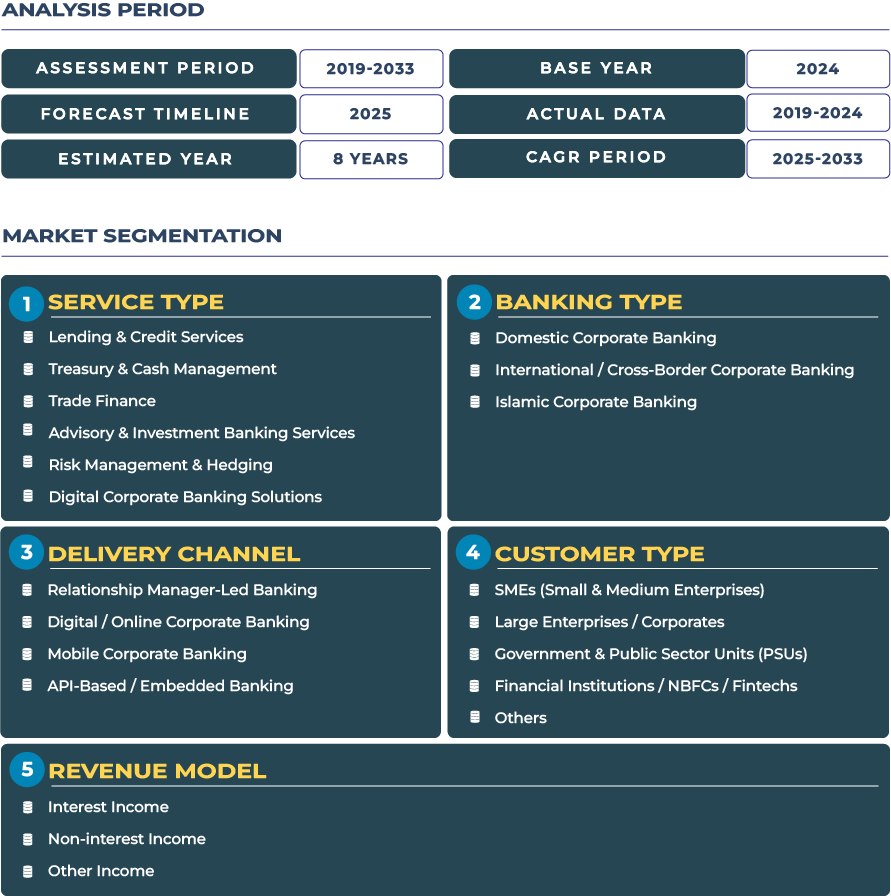Fintech Partnerships Driving Transformation in the UK Corporate Banking Landscape
The United Kingdom stands at the epicenter of corporate banking transformation, with fintech partnerships driving digital acceleration for both SMEs and large enterprises. The collaboration between established banks and fintech innovators is reshaping the corporate banking ecosystem, particularly across treasury management, trade finance, and working capital optimization. London’s position as a global financial hub enables banks like HSBC, Barclays, and Lloyds Bank to partner with agile fintech players to deliver customized, real-time financial solutions to corporates.
Note:* The market size refers to the total revenue generated by banks through interest income, non-interest income, and other ancillary sources.
The UK Corporate Banking Market is projected to reach USD 104.2 billion in 2025 and expand to USD 127.7 billion by 2033, growing at a steady CAGR of 2.6% from 2025 to 2033. This growth is driven by increasing digital adoption, embedded finance capabilities, and the demand for sustainable financing structures. The UK’s open banking environment and strong regulatory support from the Bank of England and Financial Conduct Authority (FCA) further solidify its role as a leader in corporate financial innovation.
UK Corporate Banking Market Outlook: Fintech Synergy Redefining Corporate Banking Efficiency in the UK
The UK corporate banking sector is advancing towards a digital-first future, where strategic fintech collaborations are enhancing accessibility, efficiency, and transparency. Corporate banks are leveraging fintech platforms for faster loan disbursements, dynamic liquidity monitoring, and automated compliance solutions. The rise of cloud-native treasury management systems and open API architectures has enabled corporates to streamline cash management across global operations. This technological integration supports faster decision-making and ensures greater financial agility in a volatile global environment.
Moreover, the post-pandemic recovery has accelerated demand for adaptive lending and credit services, particularly among SMEs seeking digitized financing pathways. The UK’s reputation as a fintech powerhouse, coupled with its progressive regulatory stance, continues to attract institutional investments and partnerships. With initiatives supporting sustainable and digital finance, the UK corporate banking market is expected to remain a blueprint for financial modernization through 2033.
Growth Catalysts: Fintech Collaborations, Global Treasury Activity, and Green Finance Expansion
One of the key growth drivers of the UK corporate banking industry is its deep fintech integration ecosystem. London houses over 2,500 fintech firms, fostering collaboration between banks and technology providers to develop embedded lending, invoice financing, and trade finance platforms. This ecosystem has enabled large corporates to achieve real-time access to credit analytics and SMEs to secure funding faster through digital onboarding.
Additionally, the presence of global corporate headquarters in the UK boosts syndicated loan activity and treasury inflows. The depth of capital markets and the sophistication of risk management tools make the UK a preferred base for multinational treasury operations. Furthermore, the growing emphasis on green financing, supported by the HM Treasury, is driving ESG-linked credit facilities, particularly for corporates committed to achieving net-zero goals. These factors collectively reinforce the UK’s dominance in Europe corporate banking landscape.
Restraints: Regulatory Divergence and Competitive Pressure from European Hubs
Despite its strength, the UK corporate banking market faces structural challenges. The most notable restraint arises from regulatory divergence post-Brexit, as variations between EU and UK financial rules increase compliance complexity for multinational banks. Firms are now navigating parallel frameworks for cross-border liquidity, AML, and KYC operations, adding to operational costs and regulatory burden.
Competition from emerging EU financial hubs such as Frankfurt, Paris, and Amsterdam also exerts pressure on London’s dominance. These centers are attracting regional treasury centers and capital market functions due to EU passporting advantages. Furthermore, the UK’s stringent AML/CTF (Anti-Money Laundering and Counter-Terrorist Financing) requirements, while essential for financial integrity, elevate onboarding and operational expenses. Balancing innovation with compliance will therefore remain a crucial challenge in the decade ahead.
Trends and Opportunities: Banking-as-a-Service and Sustainable Finance Leading Transformation
Several transformative trends define the trajectory of the UK corporate banking sector. One major trend is the rapid evolution of Banking-as-a-Service (BaaS) platforms, enabling corporates to integrate customized banking functions directly into their ERP and treasury management systems. This architecture supports scalable operations and multi-currency capabilities, aligning with global treasury demands.
The rise of sustainability-linked financial instruments represents another defining trend. UK-based banks and corporates are increasingly issuing ESG bonds and green loans to fund renewable energy projects and carbon-neutral initiatives. Additionally, consolidation of fintech partnerships is emerging as a key strategy among top-tier banks to expand service reach and optimize customer experience. This convergence of fintech scalability and banking trust is reshaping the corporate banking value chain into a more agile and collaborative model.
Competitive Landscape: Strategic Reinvention Among UK Banking Leaders
The UK corporate banking landscape is dominated by both domestic and global players, including HSBC, Barclays, Lloyds Bank, and NatWest Group. These institutions are strategically evolving to meet corporate needs through digital transformation and global service expansion. In 2024, Barclays expanded its Digital Treasury Platform to include multicurrency pooling capabilities, while HSBC announced a partnership with a major fintech provider to enhance cross-border liquidity solutions.
Lloyds Bank introduced a new Banking-as-a-Service API suite that enables mid-market corporates to integrate credit facilities and payments within their existing systems. Meanwhile, NatWest Group launched sustainability-linked loans designed to align corporate financing with ESG goals. These strategic advancements reinforce the competitive intensity of the UK market, emphasizing customer-centric digital innovation as the key to long-term success.







